Course presenters

Brian Albers
Brian Albers is a 3D printing engineer at St. Louis Children’s Hospital. He holds degrees in mechanical engineering, computer integrated manufacturing and computer aided drafting.
Albers has helped build, rebuild and revitalize several medical 3D-printing centers across the U.S. He has also developed production methods tailored to different physicians and practices, allowing for optimal use of medical models across a variety of specialties.
Prior to his role at St. Louis Children’s Hospital, Albers built and operated the medical 3D-printing center at Cardinal Glennon Children's Hospital in St. Louis. He was also the chief operating officer for Medlaunch STL, where he worked with student-based teams to develop new medical technology, patent devices and build medical startup companies.
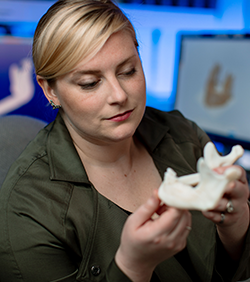
Amy Alexander, MS
Amy Alexander, MS, is unit head of mechanical development and applied computational engineering within Mayo Clinic’s division of engineering (DOE). In this role, she bridges the medical device development and additive manufacturing capabilities of the DOE with the needs of the clinical practice.
Alexander is a frequent co-author of medical 3D printing peer-reviewed papers and long-term reviewer for Springer’s 3D Printing in Medicine Journal. In 2019, she was recognized as one of 14 international recipients of the Outstanding Young Manufacturing Engineer award from the Society of Manufacturing Engineers (SME).
Alexander holds a bachelor's degree in biomedical engineering and a master's degree in engineering management from the Milwaukee School of Engineering. She also holds certificates in additive manufacturing from MIT and SME. Alexander is past chair of SME's Medical Additive Manufacturing Technical Advisory Team and is a long-standing member of RSNA's 3D Printing Special Interest Group.
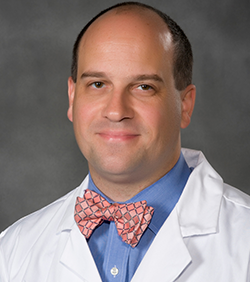
Michael Amendola, MD
Michael Amendola, MD, is a professor of surgery at Virginia Commonwealth University School of Medicine (VCU-SOM) in Richmond, Virginia. He is certified by the American Board of Surgery in both general and vascular surgery and maintains privileges at Central Virginia VA Health Care System in Richmond.
Dr. Amendola is part of the VA Office of Advance Manufacturing and is program director for the 3D printing surgical fellowship. His interests focus on mentoring novice surgical learners, hemodialysis access, 3D printing and implications of surgical simulation in the current health care environment.
Dr. Amendola received his medical degree at VCU-SOM, completed his general surgery training and vascular surgery fellowship at Virginia Commonwealth University Health System (VCUHS), and completed his master's degree in medical education at John Hopkins School of Education in 2019. In 2021, Dr. Amendola was inducted into the American College of Surgeons Academy of Master Surgeon Educators. He is a fellow of the American College of Surgeons and the Society of Vascular Surgery.
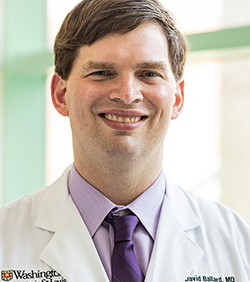
David Ballard, MD
David H. Ballard, MD, is an abdominal radiologist and assistant professor of radiology at the Mallinckrodt Institute of Radiology—Washington University School of Medicine in St. Louis.
Dr. Ballard is the director of the Mallinckrodt 3D Printing Lab, serves as a reviewer for several journals, and is an associate editor for Radiology and 3D Printing in Medicine. He has over 100 publications, with approximately 30 focused on 3D printing. Dr. Ballard has also authored numerous clinical-use documents that delineate the suitable integration of 3D printing in clinical practice.
Dr. Ballard currently serves as treasurer of the RSNA 3D Printing Special Interest Group, where he also co-chairs the SIG Appropriateness Subcommittee.
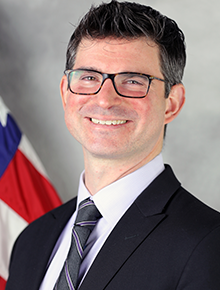
Joseph Beedle, CPA
Joseph Beedle, CPA, is the executive director of the Veterans Health Administration (VHA) Office of Advanced Manufacturing (OAM).
The OAM's goal is to enhance the VHA’s ability to ensure equitable access to patient-matched medical devices, empower clinicians to design and implement product-based solutions to clinical challenges and strengthen supply chain resiliency by providing in-house VHA manufacturing capability.
Beedle has 20 years of experience in the health care industry (in both the private sector and the federal government). He spent the last 15 years at the VHA, with 10 as the chief financial officer for the VA Puget Sound Health Care System (HCS), managing a budget of $1.5 billion, assisting with strategic direction and acting as part of their executive leadership team.
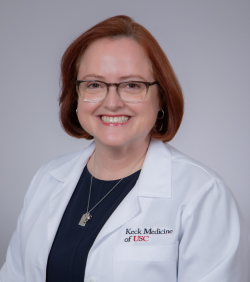
Summer J. Decker, PhD
Summer J. Decker, PhD, is the founding director of the Center for Advanced Visualization Technologies in Medicine (VISTA) at the Keck School of Medicine (KSOM) of the University of Southern California (USC). She is a full professor in the departments of clinical radiology, surgery and pathology at USC’s KSOM and serves as a professor in the USC Viterbi School of Engineering and the USC School of Cinematic Arts.
She previously established and led the University of South Florida Department of Radiology’s clinical 3D printing lab in 2011. For her clinical work, she utilizes 3D modeling and printing to create patient-specific models to assist in surgical planning, simulation and education. Dr. Decker’s research focuses on the clinical applications of 3D modeling and printing, the quantitative analysis of medical imaging, and forensic applications of medical imaging.
Dr. Decker serves on the Board of the International Society of Forensic Radiology and Imaging where she is the senior associate editor for the journal Forensic Imaging. She also serves as an associate editor of the journal 3D Printing in Medicine. She holds numerous patents on medical devices developed in her lab. For her work, she has won several humanitarian awards including the U.S. Patent and Technology Office’s 2023 Patents for Humanity Award, the Arthur P. Gold Foundation 2021 National Champions of Healthcare Award, as well as the International FormLabs Impact Award for her work’s impact on humanity and health care through 3D technologies. She currently serves as secretary of the RSNA 3D Printing Special Interest Group.
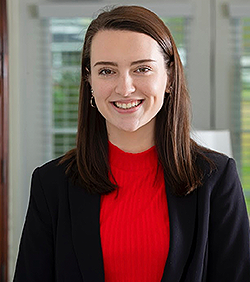
Alese P. Devin, MS
Alese P. Devin, MS is a quality engineer for the 3D Medical Applications Center (3D MAC) at Walter Reed National Military Medical Center, where her primary role is developing and implementing a quality management system (QMS) at the point-of-care. Implementation of the QMS allows 3D MAC to provide the highest level of quality and service that meets the industry standards for medical device manufacturing.
Devin obtained her bachelor’s degrees in cellular, molecular and physiological biology and neuroscience from Christopher Newport University and is currently pursuing a master’s degree in applied biomedical engineering from Johns Hopkins University.
Previously, Devin worked at Zeteo Tech, Inc., a biodefense and medical device company, where she was involved in the testing and optimization of mass spectrometry-based biosensors and development of a novel breath sampling device for diagnosis of respiratory illness.
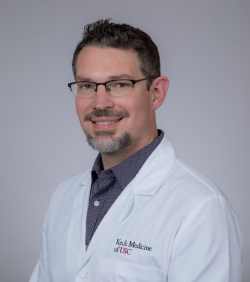
Jonathan M. Ford, PhD
Jonathan M. Ford, PhD, is an associate professor of radiology and the associate director of VISTA at the Keck School of Medicine. With a background in biomedical engineering, Dr. Ford pioneers the use of 3D modeling and printing for patient care, education and research. His work at the intersection of technology and medicine showcases a commitment to advancing health care through innovative applications.
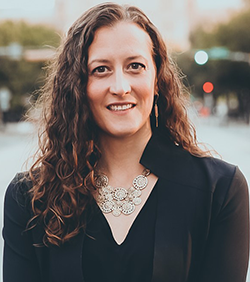
Laura Gilmour, MS
Laura Gilmour, MS, has worked with additive manufacturing in the medical device space since 2009 and has held a variety of roles, including global medical business development manager at EOS, research and development engineer at several medical device manufacturers, and a pre-market reviewer at the U.S. Food and Drug Administration (FDA). During her time at the FDA, Gilmour was a founding member of the organization's additive manufacturing working group. Using her vast experience, she helps medical device and health care organizations implement additive manufacturing into their businesses.
Gilmour is a member of Women in 3D Printing and a mentor at the Society for Advancing Gender Equity in STEM at the University of Texas at Austin. She holds a bachelor’s degree in bioengineering from the University of Pittsburgh and a master’s degree in biomedical engineering from the University of Tennessee Health Science Center.
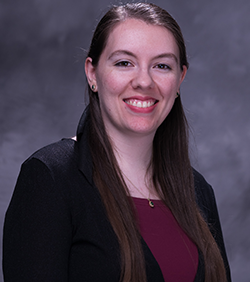
Lorelei Gorr
Lorelei Gorr is a clinical and product development engineer at VA Ventures, an innovation center within the Veterans Health Administration (VHA). She is the clinical lead for the VHA DEAN radiotherapy bolus, a 510(k) cleared class two medical device used in radiation therapy treatments—interfacing with clinicians across the VA to fulfill orders for personalized radiotherapy bolus.
Gorr is also a planner for a second 510(k) cleared class-two device—a patient-matched oromaxillofacial advanced surgical planning system. Beyond her clinical roles, she is a product development engineer for a digital transtibial socket workflow and is a member of the VA Ventures Education Outreach Committee.
Before joining VA Ventures, she managed medical equipment procurement, installation, sustainment and removal within the VA as a biomedical engineer, leveraging her expertise in complex clinical systems to accelerate veteran access to advanced personalized medical care.
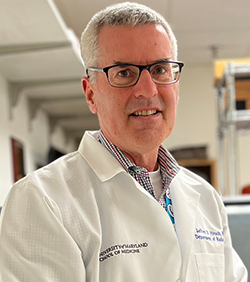
Jeffrey D. Hirsch, MD
Dr. Hirsch is an assistant professor in the Department of Radiology at the University of Maryland, School of Medicine. He received his B.S. in Optics from the University of Rochester in 1986 and his M.D. from the F. Edward Hebert School of Medicine at the Uniformed Services University of the Health Sciences in Bethesda, Maryland in 2000. Prior to his pursuit of medical training, Dr. Hirsch served in the U.S. Navy as a Bombardier/Navigator from 1986 to 1994. He completed a residency in Radiology at Walter Reed Army Medical Center and the National Naval Medical Center in 2005. He then served the U.S. Army as a Radiologist with posts in Ft. Eustis, VA; Ft. Belvoir, VA; and Ft. Meade, MD between 2005 and 2012. Dr. Hirsch also deployed with the 28th Combat Support Hospital to Baghdad, Iraq in support of Operation Iraqi Freedom from 2006 to 2007. After his Army retirement in 2012, he completed a fellowship in Informatics and Musculoskeletal Imaging at the University of Maryland Medical Center. He provides image-based 3D printing services for University of Maryland Medical Center and Johns Hopkins Hospital for clinical efforts, research projects and collaboration with other clinicians.
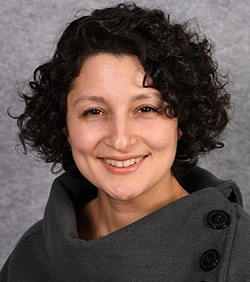
Nooshin Kiarashi, PhD
Nooshin Kiarashi, PhD, is a lead scientific reviewer and digital health engineer in the Center for Devices and Radiological Health at the FDA. She also serves on the center’s additive manufacturing working group. Dr. Kiarashi is a graduate of the Carl E. Ravin Advanced Imaging Laboratories at Duke University, where she worked on realizing virtual clinical trials in breast imaging and developed the first additively manufactured breast phantoms based on human images.
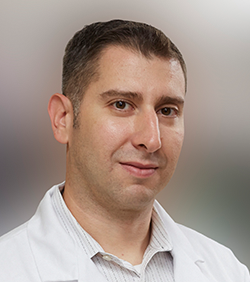
Peter C. Liacouras, PhD
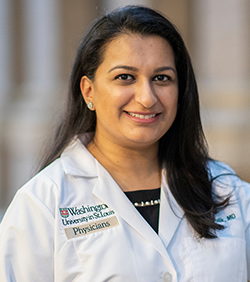
Mariam A. Malik, MD
Mariam A. Malik, MD, an assistant professor of radiology at Mallinckrodt Institute of Radiology (MIR). She was named a 2023-2025 Loeb Teaching Fellow for her work developing interactive radiologic interpretive imaging exercises to enhance clinical anatomical understanding and application for the Gateway Curriculum. She was also recognized by the Academy of Educators at Washington University School of Medicine in St. Louis, Her clinical and research Interests are in bone and soft tissue tumors, joint disorders, sports medicine, and ultrasound.
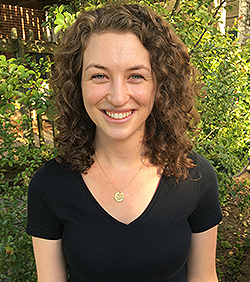
Nicole McMinn, MS
Nicole McMinn, MS is a biomedical engineer for the 3D Medical Applications Center (3D MAC) at the Walter Reed National Military Medical Center in Bethesda, Maryland.
In her current role, McMinn applies different types of additive manufacturing techniques in support of medical applications. She designs and creates anatomic models, digital reconstructions, orthotic and prosthetic attachments, and surgical task trainers. McMinn also assisted in the development and implementation of a quality management system for the 3D MAC, which allowed the center to register as a medical device manufacturer.
Previously, she worked at the FDA, first as a research fellow in the Center for Devices and Radiological Health (CDRH) Office of Science and Engineering Labs and then in the Office of Product Evaluation and Quality as a lead reviewer of orthopedic devices. McMinn served as one of the MR subject matter experts for the Office of Orthopedic Devices and as team lead of the shoulder team. McMinn earned her bachelor’s degree in mechanical engineering from California Polytechnic State University, San Luis Obispo and her master’s degree in mechanical engineering from Johns Hopkins University.
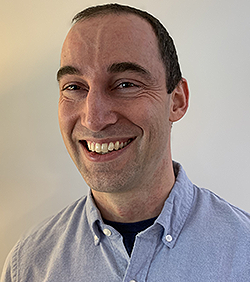
Brian Patterson, MS, MAT
Brian Patterson brings a passion for education into the field of medical 3D printing. Currently, Patterson is the program director of the 3D Lab for Geisinger Health in Pennsylvania. In this role, Patterson works to improve patient care, clinical education and communication with patients and their families.
He started his career by earning dual bachelor's degrees in biology and psychology from the University of Maryland, Baltimore County (UMBC). He then completed a Master of Art in Teaching from UMBC as part of the National Science Foundation Initiative to bring highly qualified math and science teachers into high-needs schools in Baltimore County.
Previously, Patterson was a biology teacher in Baltimore County Public Schools, where he built a program for students interested in biomedical sciences. While teaching, he earned a second master's degree in applied biomedical engineering from Johns Hopkins University.
During his studies, Brian became interested in the potential of medical 3D printing, and he worked for a small start-up company that produced custom 3D printed prosthetic covers, later evolving into a design and prototype firm.
This combination of skills led to his current position as the program director of the 3D Lab for Geisinger Health in Pennsylvania.

Beth Ripley, MD, PhD
Beth Ripley MD, PhD, is the deputy chief for the Office of Healthcare Innovation and Learning at the Veterans Health Administration (VHA) and is an associate professor of radiology at the University of Washington School of Medicine.
Dr. Ripley is the founding director of the enterprise wide VHA Office of Advanced Manufacturing, whose goal is to provide access to 3D printing services and patient specific health care solutions to all nine million veterans.
Dr. Ripley specializes in translating medical imaging into virtual and 3D-printed models, with the goal of changing the way doctors and patients understand and treat disease. She collaborates across multiple disciplines and has a passion for innovation and human-centered design.
Dr. Ripley served as chair of the VHA 3D Printing Advisory Committee from 2017 to 2021. Awarding her work with 3D printing at the VHA, she received the Samuel J. Heyman Service to America Medal for Science and the Environment in 2020. She currently serves as vice-chair of the RSNA 3D Printing Special Interest Group.
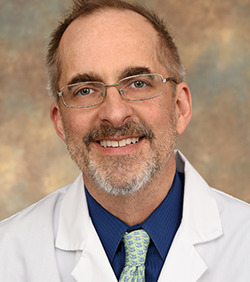
Frank Rybicki, MD, PhD
Frank Rybicki, MD, PhD is vice chair of operations/quality at the University of Cincinnati. He is the Director of Medical Affairs at Imagia. Dr. Rybicki founded and served as the first chair of the RSNA 3D Printing SIG. Dr. Rybicki created/delivered the first CME program in 3D printing (RSNA 2014) and he created/delivered the first “hands-on” 3D printing program (RSNA 2015). He is the Editor-in-Chief of 3D Printing in Medicine, co-editor of 3D Printing in Medicine: A Practical Guide for Medical Professionals and has published 3D printing data and position statements in The New England Journal of Medicine, Lancet and other multidisciplinary journals. In conjunction with colleagues from the American College of Radiology (ACR), Dr. Rybicki established Category III CPT codes (July 2019) for anatomic models/surgical guides. His mentees have won numerous awards and honors in3D printing and virtual reality and are now poised to shepherd these collective technologies into hospital-based practice.
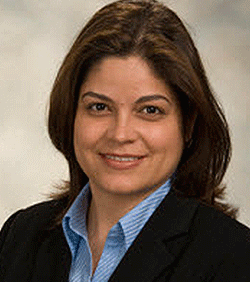
Lumarie Santiago, MD
Lumarie Santiago, MD, is a professor of diagnostic radiology in the department of breast imaging at The University of Texas MD Anderson Cancer Center (MDACC), where she also helped establish and lead the Medical 3D Printing and Advanced Visualization Laboratory. Her interests are novel breast imaging techniques and personalized treatment options, including breast cryoablation and 3D printing.
Dr. Santiago has led research in neoplastic seeding in breast cancer in addition to the impact of 3D printed breast models in the decisional conflict of patients with breast cancer. She currently serves as chair of the RSNA 3D Printing Special Interest Group.
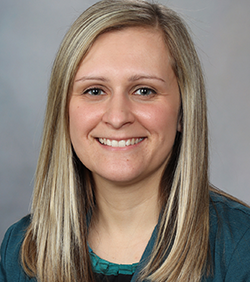
Victoria Sears, MS
Victoria Sears, MS, is a senior engineer within Mayo Clinic’s Anatomic Modeling Unit (AMU) in the Department of Radiology, where she develops innovative and unique medical solutions to clinical challenges utilizing additive manufacturing capabilities.
As part of the clinical care team, she collaborates with physicians, radiologists and technicians to create accurate 3D printed anatomic models and patient-matched osteotomy guides. Sears is the AMU’s lead planner of virtual cranio-maxillofacial surgeries.
Apart from her current role, she has supported and contributed to the medical additive manufacturing community for eight years, helping with educational documents, professional conferences and peer-reviewed papers. Sears has a bachelor’s and master’s degree in bioengineering from the University of Michigan, where her graduate thesis was centered around developing bioink for 3D printing.
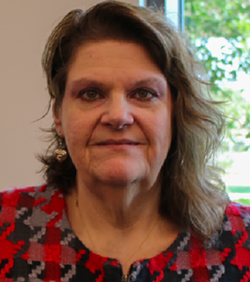
Teri Snyder, MBA
Teri Snyder, MBA, is the quality and regulatory program manager within the Medical Modeling, Materials and Manufacturing Division (M4) of the Center of Design and Manufacturing Excellence in the College of Engineering at The Ohio State University.
The M4 Lab utilizes 3D printing to find innovative solutions for real-world needs in clinical medicine. Their current efforts aim to benefit patients undergoing new, uncommon or complex surgeries at The Ohio State University Wexner Medical Center by providing 3D anatomic models and surgical guides. These devices help medical professionals with surgical planning, patient education and medical training. Snyder has established a quality management system for this clinical workflow, and she is an ISO:13485 lead medical device systems auditor and lean six sigma greenbelt.
Snyder has 30 years of global experience in various regulated product industries as a quality and regulatory systems management professional. She has established continuous improvement programs and ISO quality systems for more than five companies that manufacture regulated products for the Enviromental Protection Agency, Defense Department and FDA.
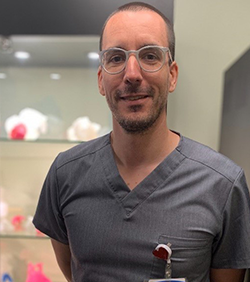
Greg Sturgeon
Greg Sturgeon is a cardiac sonographer at the Duke Children’s Pediatric & Congenital Heart Center in Durham, North Carolina. In addition to his role in clinical echo imaging, Sturgeon is responsible for creating their 3D cardiac anatomical models.
He’s been interested in 3D modeling and medical imaging for nearly 20 years and has coded three different marching cubes variants—just for fun.
Before joining the echo lab, Sturgeon worked in a medical physics research lab, where he was involved in image segmentation and geometric modeling. He has published extensively and completed all the coursework towards a PhD in biomedical engineering but is instead pursuing a career in a more clinical environment.

Mark Tan, MD
Mark Tan, MD, is a radiologist and clinical lead of the Singapore General Hospital 3D Printing Centre. Dr. Tan has professional interests in the employment of imaging for the planning, rehearsal and performance of head and neck surgeries, in addition to plastic and reconstructive, neurosurgical, oncological, orthopedic and cardiac surgeries.
Dr. Tan is also interested in designing and producing from medical imaging, patient specific anatomical models for surgical rehearsal and implant sizing, surgical guides for localization and reconstruction, appliances (i.e. orthotics and prosthetics) and non-resorbable and bioresorbable implants for clinical care.
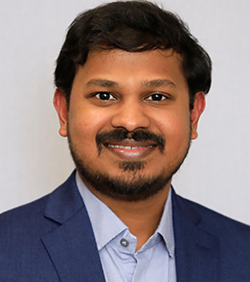
Karthik Tappa, PhD
Karthik Tappa, PhD, is the 3D printing engineer in the MD Anderson Cancer Center’s Anatomic 3D Printing and Visualization Program. As a biomedical engineer specializing in multiple additive manufacturing technologies, he has made significant contributions to medical 3D printing.
Dr. Tappa’s research has been published in numerous biomedical engineering journals, showcasing his innovative approaches to personalized health care solutions. His work has expanded the theoretical understanding of 3D printing applications, translating into tangible advancements in patient care.
With a wealth of knowledge and expertise, Dr. Tappa has actively engaged with both academic and industry professionals. He has collaborated on interdisciplinary projects and fostered partnerships between engineering and medical communities. As a visionary in the field of 3D printing at the point-of-care, Dr. Tappa continues to explore new frontiers. He envisions a future where personalized medicine is enhanced through the seamless integration of engineering innovation.
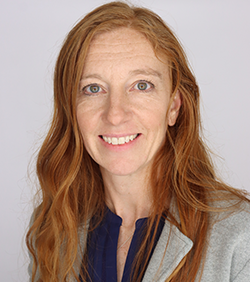
Kim Torluemke, RAC
Kim Torluemke, RAC, began her career in 3D printing by leading the development effort on medical modeling’s first FDA cleared 3D-printed product in 2009.
She continued the path of increasing quality and regulatory oversight, including oversight for 3D printed medical devices, dental products and software as medical devices, produced across five sites on three continents.
After her tenure as vice president of regulatory at 3D Systems, Torluemke used her expertise to guide clients through the evolving landscape of regulation, ensuring safe and effective products made it efficiently to market. She joined the Mayo Clinic’s division of engineering in the fall of 2022, working to uphold their quality efforts for one-of-a-kind devices, supporting Mayo Clinic’s surgeons and patients.
Torluemke holds a bachelor's degree from the Colorado School of Mines in Mechanical Engineering and received her Regulatory Affairs Certification U.S. credential in 2018, demonstrating thorough knowledge of regulatory functions throughout product lifecycle for medical devices, IVDs, pharmaceuticals and biologics.
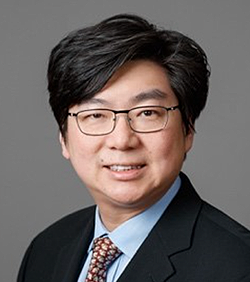
Ek Tsoon Tan, PhD
Ek Tsoon Tan, PhD, is co-director of the MRI laboratory in the Department of Radiology and Imaging at the Hospital for Special Surgery in New York. He is also an associate professor of biomedical imaging in orthopedic surgery at Weill Cornell Medical College. Dr. Tan’s expertise and research interests include MR neurography, quantitative MRI, and diffusion imaging as applied to musculoskeletal imaging. Dr. Tan received his PhD in biomedical sciences from Mayo Clinic and his bachelor's and master’s degrees in engineering from the National University of Singapore.
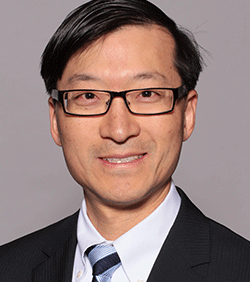
Kenneth C. Wang, MD, PhD
Kenneth C. Wang, MD, PhD is a staff radiologist and MRI section chief at the Baltimore VA Medical Center and is an adjunct associate professor at the University of Maryland School of Medicine.
Dr. Wang completed residency and fellowship training at the Johns Hopkins Hospital, as well as a fellowship in imaging informatics at the University of Maryland. He has worked on standards development with RSNA and the Logical Observation Identifiers Names and Codes database. Dr. Wang’s research interests include ontologies, interoperability, image segmentation, MR neurography, 3D printing, liver imaging and shoulder surgery.
Dr. Wang earned his bachelor’s, master’s and doctorate degrees in electrical engineering from Stanford University and his medical degree from the University of California, San Francisco. He currently serves as the Radiology Informatics Committee liaison for the RSNA 3D Printing Special Interest Group.
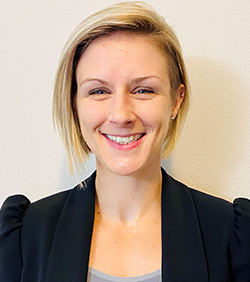
Arrianna Willis, MS
Arrianna Willis, MS, serves as the deputy director of operations for VA Ventures, a national innovation center within the Office of Healthcare Innovation and Learning in the Veteran’s Health Administration (VHA).
In her current role, she oversees and leads the manufacturing of medical devices and is leading the effort to sustain current medical-device production processes. She is also guiding expansion efforts into new medical-device production, increasing equipment and personnel capabilities.
Before joining the VHA team, Willis worked as a research engineer in biomechanics and investigated human biomechanics and mechanisms of injury in automotive, aerospace and athletic environments.
Contact us
For questions, please contact 3dsig@rsna.org.